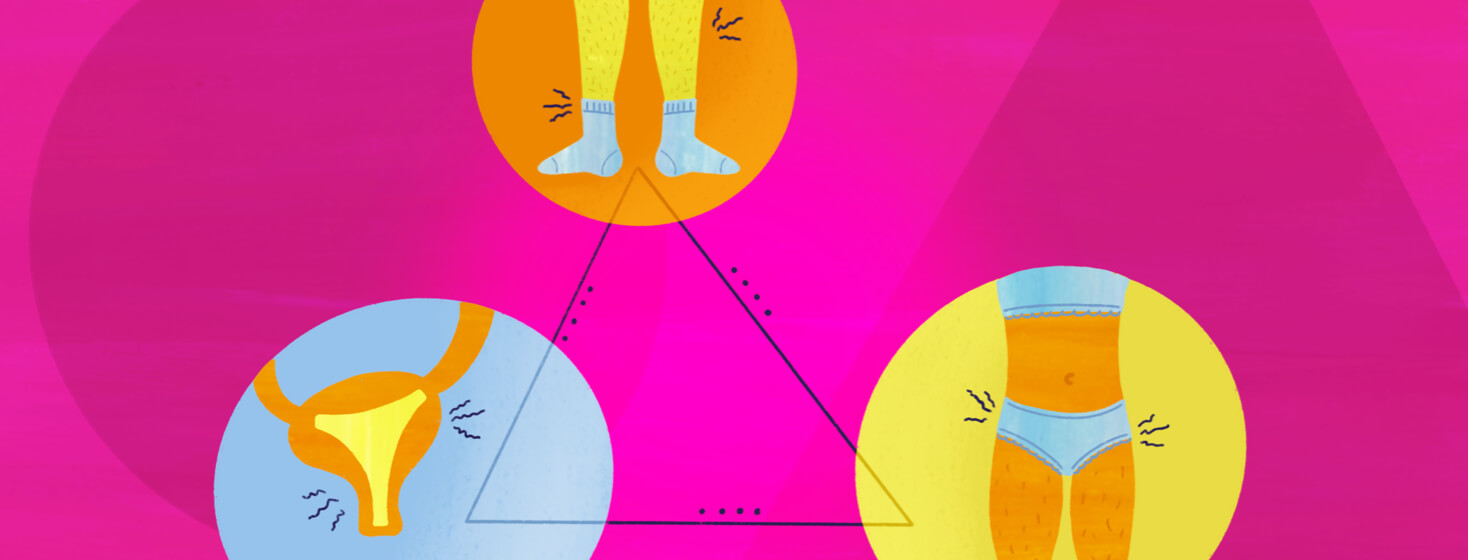The Link Between RLS, RGS, and Overactive Bladder
Restless legs syndrome (RLS) causes people to have an uncontrollable urge to move their legs. This is usually because their legs are so uncomfortable that they feel the need to move them. This generally happens at night or while sitting or lying down.1
RLS has been linked to both restless genital syndrome (RGS) and overactive bladder (OAB), and many people who have RLS also have one of the other two. Understanding what RGS and OAB are can help you make changes to ease symptoms and make daily life more manageable.1-4
What is RGS, and what are possible causes?
RGS causes persistent, strong sensations of genital or clitoral arousal without feelings of sexual desire. People with RGS experience unwanted and unpleasant genital sensation. The feeling is usually more noticeable when sitting or lying down at night, similar to RLS.2
RGS is diagnosed by determining if a person has these persistent feelings of arousal as well as having RLS or OAB. Symptoms are usually relieved by sexual activity or masturbation. The people most likely to experience RGS are middle-aged and older women.2,3
Doctors believe that the signals that usually convey touch and arousal do not work properly for people with RGS. Researchers have found that RGS is possibly caused by damage to the nerves that send signals about sexual arousal and touch to the brain from the genitals. It could also involve an issue with dopamine, a signaling chemical in the nervous system.2,3
What is OAB, and what are possible causes?
OAB is a condition that causes a sudden and frequent urge to urinate. People with OAB can sometimes unintentionally urinate (called urinary incontinence) because of this need. OAB can also cause more frequent urination, usually 8 or more times in a day. It can also cause people to wake up more than twice a night to urinate.4
As a person’s bladder becomes full, the muscles in the bladder send signals to the brain that it is time to urinate. The brain takes these signals and sends back signals to pelvic floor muscles to relax and bladder muscles to contract. These muscles work together to cause urination.4
For someone with OAB, bladder muscles may contract or spasm on their own without the go-ahead from the brain. This is what creates the need to urinate and, in some cases, urinary incontinence.4Similar to RLS and RGS, OAB can be caused by issues in the nerves that send signals to the brain. The nerves in the bladder can be damaged, and so can the nerves in the brain that send signals to the bladder.4
What are some common impacts on life with RLS, RGS, and OAB?
One of the more common issues with these 3 conditions is social and mental health impact due to perceived shame or embarrassment for someone who has them. People with these conditions often also have:4
- Anxiety
- Emotional distress or depression
- Issues with sexual function
Many people with RLS, RGS, and OAB find it difficult to fall asleep. If they suffer from consistent sleep debt, it can lead to fatigue, memory issues, moodiness that can affect relationships, and long-term health issues.1,4,5
Women with OAB may also have stress incontinence. Stress incontinence is a type of urinary incontinence caused by physical movement or activity putting pressure on your bladder. This can be exercise, or something like sneezing, coughing, or laughing.4
How are RLS, RGS, and OAB treated?
There are currently no cures for RLS, RGS, or OAB, but there are paths available to help you manage symptoms.
One of the recommended treatments, particularly for RGS and OAB, is cognitive behavioral therapy (CBT). CBT can help address the possible psychological aspects of RGS and OAB. It can also help with overcoming emotional distress, anxiety, or issues with sexuality and shame.2
For OAB, and for each of these 3 conditions, you should also:4
- Get regular physical activity
- Stop smoking
- Limit caffeine and alcohol
- Talk to your doctor about chronic conditions that may contribute to OAB symptoms, like diabetes
- Do exercises to strengthen the pelvic floor muscles
There are also drugs available that are approved for moderate to severe RLS. Some of these drugs help your dopamine levels. Others are muscle relaxants or sleep aids.1
However, these drugs can have many side effects. These include daytime sleepiness and problems with impulse control (like compulsive gambling). Talk to your doctor about what drugs are right for you.1

Join the conversation